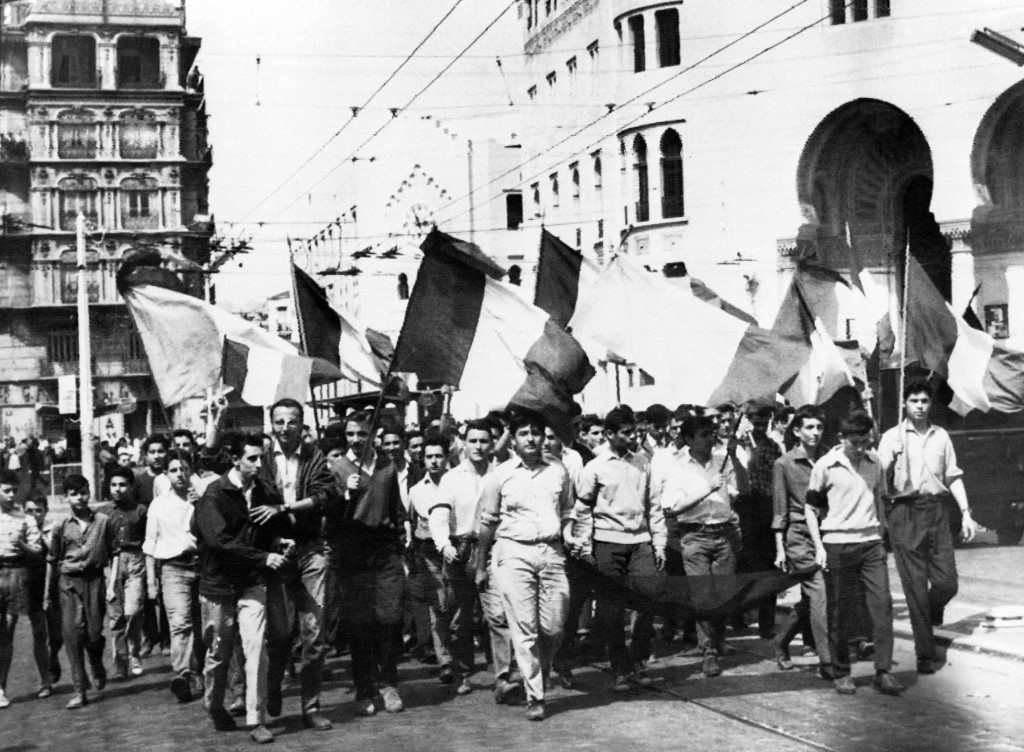'In my heart': the Europeans who remain in Algeria, 60 years on
Sixty years after the Evian accords which ended French colonisation of Algeria, some Europeans remain -- and call themselves "true Algerians".
Change Size
 In this file photo taken on May 13, 1958, youths waving French flags roam the streets of Algiers, on their way to the Forum square and the government palace stormed by demonstrators, during the Algerian war. The Evian Accords were signed on March 18, 1962, between France and the Provisional Government of the Algerian Republic (GPRA), the government-in-exile of the Algerian National Liberation Front (FLN), ending the Algerian War of 1954-1962 and pathing the way for Algeria's Independence from France. (AFP/AFP)
In this file photo taken on May 13, 1958, youths waving French flags roam the streets of Algiers, on their way to the Forum square and the government palace stormed by demonstrators, during the Algerian war. The Evian Accords were signed on March 18, 1962, between France and the Provisional Government of the Algerian Republic (GPRA), the government-in-exile of the Algerian National Liberation Front (FLN), ending the Algerian War of 1954-1962 and pathing the way for Algeria's Independence from France. (AFP/AFP)
M
arie-France Grangaud says she has only one regret: she has spent eight decades in Algeria, the country of her birth, but she still hasn't learned Arabic.
Sixty years after the Evian accords which ended French colonisation of Algeria, some Europeans remain -- and call themselves "true Algerians".
"Right up until my final year of high school, there wasn't a single Algerian in my class," she said.
France occupied the North African country for 132 years and, over time, hundreds of thousands of Europeans settled there.
Despite a devastating eight-year war that finished in 1962 with Algeria winning independence and many of these "pieds-noirs" -- literally "black feet" -- moving to France, around 200,000 chose to stay.
According to historian Helene Bracco, about 30,000 Europeans were still in the country in 1993. But the "black decade" of civil war in the 1990s pushed many others to leave for France.
Grangaud, the daughter of a Protestant family, was born in 1938 and grew up in an environment that was "exclusively European", she said.
She spent most of her childhood in the western town of Oued Rhiou, as her father was away fighting in World War II.
"We were living in an isolated area where there was no school," she said.
So when her father returned, the family moved to Algiers.
At a meeting for young Protestants she met Jean-Paul Grangaud, whom she married on March 10, 1962, just days before the Evian accords that brought an end to the war.
Shortly before independence on July 5, 1962, the couple moved to France as her husband was called up for military service. They didn't stay long.
The following year they returned to Algiers and "settled there for good," she said.
"We didn't try to integrate with the other Europeans who had stayed, but we rather wanted to know Algerians," Grangaud recalled.
He became a teacher in pediatrics at a hospital in Algiers, where he supported the sick and his students "as best he could with very few means", she added, with emotion.
In 1961-62, he had built good ties with independence fighters, giving them medicines and blood, Grangaud said.
'Children of the land'
The doctor, who became an adviser to the health minister, took Algerian nationality in 1970. He died in 2020 at the age of 82.
The couple have five children, three of whom have Algerian names.
"They grew up here, went to Algerian schools and speak Arabic fluently," said Grangaud.
Like her husband, she got Algerian nationality, in 1972. She did so "by choice", because of her attachment to the land where she was born.
That, however, did not prevent the couple from facing some challenges in being accepted.
"Not being like everyone else, that is to say, not Muslim, and of French origin," she said.
"We were young and optimistic. We said, 'This is our home, we were born here. Let's stay.'"
Leaving "was so traumatic" for the "pieds-noirs", Grangaud said, because they "were all very attached to Algeria".
One who left as a child but returned as an adult, is Caroline Altairac-Janssen.
She said her mother's family had been in Algeria for five generations but she moved to France in 1959 when her father was posted there.
After independence, some of her family chose to stay, as they had roots and a social life "deeply anchored" in the country.
Altairac-Janssen returned to Algeria decades later in 2006 to look after a family business started nearly a century before, in 1918.
"Today I'm definitively Algerian in my heart," she said. "It's a magnificent, misunderstood country."
She is also "proud to be a French person in Algeria and honoured to be accepted as such," the 69-year-old said.
"I have lots of memories of childhood and being a teenager, holidays at my grandparents or with my cousins. All of us were children of the land of Algeria."









